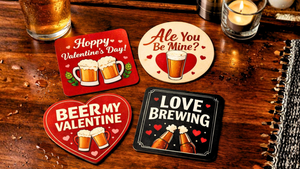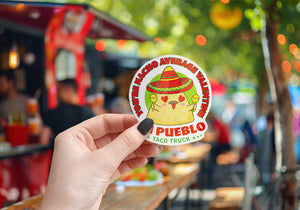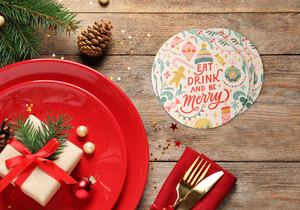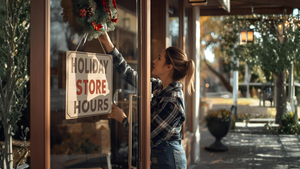How to Design the Perfect Canopy Tent: A Complete Guide

Trade shows, festivals, and other events can be massive affairs, sprawling indoors and out. A canopy tent is a must for your table, booth, or product display – and not just for repelling the rain or giving you and your customers a break from the heat of the sun. Custom-designed canopy tents can be a major part of your presence and a crucial marketing tool.
Designing the perfect custom canopy tent requires attention to detail, an understanding of tent quality and sizes, and creating a design that reflects your brand. Unfortunately, this can feel overwhelming to many business owners. Read on for a complete guide to custom canopy tents, must-have features, and key considerations for creating your custom design.
What Is a Canopy Tent?
Canopy tents are open-sided portable tents. Easy to fold and carry, with a wide variety of sizes, styles, and design options, canopy tents are popular with both the backyard barbecuer and the trade show-exhibiting business on the go.
Often made of polyester and with an aluminum frame, canopy tents are relatively lightweight and easy to transport. This makes them a ready-made solution for anyone wanting to create a unique space for product displays or food vending that also shields staff from outdoor elements.
A canopy tent is not, or at least not often, a fully-enclosed space. While there are options, which we’ll review below, to add full or half walls to your custom canopy design, canopies are usually open on all four sides.
Where Are Canopy Tents Used?
Anywhere people gather, you’re sure to see canopy tents in use. From festivals, concerts, and tailgating parties to family reunions, backyard get-togethers, open-air markets, outdoor and indoor trade shows, and more.
Businesses use canopies for a few reasons: to create a unique space for their brand, provide shelter from the elements, and as part of their branding and marketing efforts.
Custom canopy tents aren’t just for outdoor events, however. Many trade shows take place in large indoor arenas where each business exhibiting may use a 10’ x 10’ canopy.
How Can a Custom Canopy Tent Be Part of Your Branding?
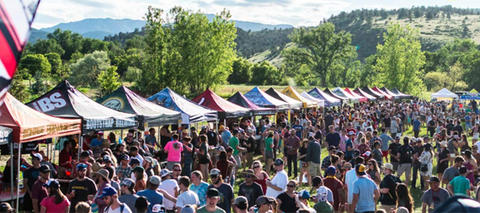
Because your company’s canopy tent is quite likely the first thing people see at a fair or on the trade show floor, it needs to draw attention in a way that catches the eye of prospective customers. In other words, your tent needs to represent your business, your products, and your brand. And since custom canopy tents are ideal for both outdoor and indoor use, they’re great tools to use for both booth or product marketing and brand representation.
The canopy tent can be customized with colors, text, and graphic design elements. You also have plenty of options to raise your tent’s visual appeal and grab attention with the addition of half or full walls. Your logo, product-featuring images, and even half walls displaying pricing or purchasing information are all things a custom-designed canopy will help you show.
You can think of your tent as either a mini-billboard or a gigantic business card. What do you want to show to grab attention, and what do you need to display to viewers so they know what’s inside? While you’re likely to have actual business cards, pamphlets, stickers, and other trade show swag available inside, you can never display your name, website, or any other relevant information enough.
What is the Difference Between a Tent and a Canopy?
Tents and canopies are often used interchangeably, but there is a difference between the two types of coverings. Simply put, if the structure has a roof and supports, but is not covered on all sides, it is a canopy. If it has a roof, supports, and the exterior is fully enclosed, it is a tent. Tents and canopies also differ in terms of use and accessibility. Tents are perfect for large events or parties where many people are expected to gather in the same enclosed space; think weddings, graduation parties, etc. Canopies on the other hand are designed to be easily transported and are the perfect addition to any outdoor show, festival, or fair.
Custom canopy tents are often made with professional-grade polyester, an extra-durable, long-lasting form of fiber. The material makes it waterproof, fade-proof, and flame-retardant. No matter how long you go between shows, with your tent folded up and stored away, your canopy is going to look clean, fresh, and sharp every time you set it up.
What Are Custom Canopy Tents Made Out of?
The most common canopy top material is durable polyester because it is lightweight and easy to fold and transport. Ease of use is an important consideration for canopy material, but so is durability and weather resistance. Unless you’re only going to be attending only indoor shows, making sure you, your customers, and your products are sheltered from sun, rain, and even potentially snow is essential.
7 Tips for Designing a Custom Canopy Tent
Investing in a custom-designed canopy tent is great for any business. It announces to everyone around you just who you are, what you do, and what’s going on inside. And as an added benefit, your tent will also help build brand recognition as you attend more events. Soon enough, your growing group of loyal customers will begin to seek out your booth just by looking for your signature custom canopy design.
While a canopy tent is a boon to your marketing efforts and booth, it is also an investment. When making your purchasing and custom design decisions, it’s critical to understand the choices available to you. So let’s take a look at tent features and options, so you can decide what’s right for you.
1. Size and Use
Custom canopy tents can come in three sizes – 10x10, 10x15, 10x20. From small enough to make your display feel cozy to big enough to host a whole party.
But before you can decide what size works for you, however, you need to know just how much room you want to – or are allowed to take up. Trade shows and other events often allot only so much room per vendor. Showing up with a massive tent that intrudes on your neighbors’ allotted space isn’t just rude, it also means you won’t be able to set up and display the tent you put a lot of time and effort into designing.
Another aspect to consider when selecting tent size is just how you intend to use it. Understanding your actual display and how many tables or stands you’re going to use is one part of how you’ll use your tent. The other is how you’ll use it in conjunction with other display and advertising elements. Canopy walls, flags, and table covers all have to be cohesive.
Considering these additions and how much room they take up will help you narrow in on the just-right tent size for you and your displays.
2. Set-Up Time and Portability
Canopy tents are quite easy to set up. However, if you’re a one-person operation, a large tent may be more than you want to deal with on your own. Your tent is only one part of your setup, so it’s up to you to haul in and arrange the rest of your display tables, products, and other show elements. When purchasing a tent, make sure to consider the type of custom canopy tent you would be comfortable setting up by yourself.
Another important portability element to bear in mind is how much space your tent and accessories will take up in a vehicle. As with setting up your actual booth (tables, products, tent, and all), make sure you have room to transport everything you’ll need.
3. Walls
Adding additional walls to your tent design increases brand visibility, expands your advertising space, and further communicates what’s inside the tent. The addition of one or two full or half walls also provides additional shelter from the rain, cold, wind, or direct sun, which many people will attest is no small thing to take into account.


Half wall options are great for any business that wants to draw attention to their area. Combining a full back wall with one or two half walls can help further drive brand visibility. In addition, front and back printing lets you grab prospective customers’ attention no matter which side of your tent they see first – putting you miles above the competition.
4. Canopy Frame
Since outdoor events are held year-round in some locations, your frame needs to be durable enough to withstand the various weather elements.
Powder-coated steel frames are a popular option for custom canopy tents, but hexagon anodized aluminum is a premium frame that offers a more durable option. Both of these frames are lightweight and easy to carry and set up - plus they are quite strong.
A tent that's light and looks cool is all well and good, but if it can't withstand inclement weather, what’s the point?
Any canopy tent you purchase offers the ability to adjust the height. Being able to change the height of your tent lets you effortlessly adapt to a variety of both indoor and outdoor settings. We’d also recommend purchasing weight bags or ground-spike hardware to keep tents grounded on windy days. No matter what type of frame you buy, the wind can catch the canopy tent when outside.
5. Pop-up Frame Design
Like tent sizes, frames run a gamut of design options. From pole tents to framed-out tents to pyramids and cross-truss pop-ups, there's quite an array of designs available. Some options are better than others when it comes to durability and ease of use.
Pop-ups are the most popular type of canopy tent for businesses. Pop-up canopies are easy to use, but make sure to choose a premium frame for that added durability factor.
6. Protection and Durability
Whatever else your tent needs to do – draw attention, advertise your wares, promote your brand – it for sure needs to keep you out of the rain and safe from the sun. And it needs to last.
When shopping for your custom canopy tent, the best material you can find is professional-grade 600D polyester. This material is incredibly long-lasting, waterproof, UV safe, and flame-retardant. Other materials or types of material may also last you a while, but professional-grade polyester will be around for the long haul.
7. Custom Printing and Design
Last, but not least, consider the design and printing of your custom canopy. Creating a design that fits the size, shape, and material of your tent – and complements your overall marketing strategy – is a tall order.
Plan the design carefully to ensure it blends seamlessly with your display, products, and brand. For the best experience, work with a printer like Stomp who is familiar with pop-up custom canopy tents. Take your time with this step, and make sure to get help from experienced printing professionals.
How to Design a Custom Canopy Tent with Stomp
With Stomp, you can not only create your perfect custom canopy tent design, but you can also count on the quality of the canopy tent itself. With multiple sizes, full and half wall options, premium frame material, and professional-grade canopy material, Stomp custom canopy tents keep you out of the rain and on top of your game.
Promote your brand, host your event, and stand out on the trade show floor with Stomp custom canopy tents. Check out our custom canopy tents and accessories or canopy templates page to get started today.
Frequently Asked Questions for Custom Canopy Tents
Are Custom Canopy Tents Hard to Set-Up?
Nope! Custom canopy tents are designed to be easily put up and taken down, as they are entirely portable and can be set up in just a few minutes.
How Durable Are Custom Canopy Tents?
Custom canopy tents with Stomp are not only capable of withstanding windy days or hot temperatures, our canopy tents are also waterproof, flame-retardant, and UV protected so you have the flexibility to bring your canopy tent wherever your business takes you!
Why Do Businesses Need Custom Canopy Tents for Events?
Simply put, custom canopy tents are an easy and efficient way to promote your brand. Trust us, once you realize the benefits of having a branded structure at your next fair or festival, you’ll wonder why it took so long to purchase one to begin with.
What is Included in a Custom Canopy Tent?
Stomp’s custom canopy tents include any and all accessories you need to set up your canopy straight out of the box. Our canopy tents include a custom polyester top, a durable frame, and a complementary roller bag with spikes and rope.
Do Canopy Tents Need Weights?
While canopy tents do not need weights to function, it is smart to purchase canopy weight bags to be sure you can use your custom canopy tent even in the strongest of winds.- Marketing Team

